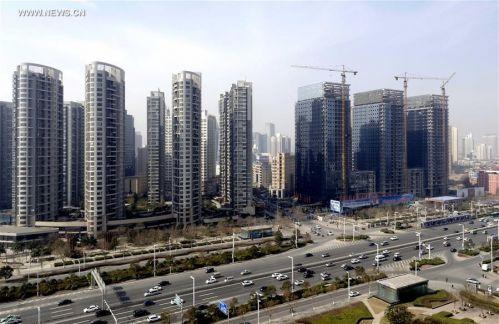
China is seeking to maintain stability in the property market this year after the roller coaster ride of 2016, with measures to prevent surges in metropolises and the growing inventories in small cities. (Xinhuanet file photo)
BEIJING, April 18 (Xinhua) -- China's tightened regulations on the property market to rein in skyrocketing home prices have begun to pay off as home prices in major cities continued to stabilize.
Of 70 large and medium-sized cities surveyed, 24 cities witnessed a slower price rise year on year in March, up from 20 in February, said the National Bureau of Statistics (NBS) on Tuesday.
Among the 15 first- and second-tier cities surveyed, six cities saw a month-on-month price decline in March and six saw price gains of less than 0.5 percent.
In Beijing, new residential house prices rose 0.4 percent month on month in March, while Shanghai prices fell 0.1 percent. House prices in Shenzhen, a southern metropolis neighboring Hong Kong, slid 0.3 percent.
"Prices of newly built homes in 15 major cities including Beijing, Shanghai, Guangzhou and Shenzhen continued to stabilize in March on the back of targeted local government policies," said NBS statistician Liu Jianwei.
Property sales recorded strong growth in 2016 with an annual gain of 22.5 percent, thanks to two years of policy easing, starting with relaxation of purchase restrictions in 2014 and fueled by pro-growth policies, including interest-rate cuts.
Since October last year, the Chinese government has implemented a slew of measures to cool runaway housing prices, including restrictions on home purchases and increased minimum down-payment requirements.
The property market, however, picked up its pace in February this year after price gains slowed in previous months, which has led to the biggest wave of tightening of home purchase and lending rules since mid-March.
Dozens of Chinese cities have implemented tougher cooling measures to limit price gains since mid-March, following Beijing's unprecedented harsh curbs that lifted the down-payment ratio for second homes to 60 percent.
Meanwhile, China's central bank has also urged banks to strengthen
mortgage risk management and crack down on market irregularities such as fake divorces to skirt high down-payment requirements.
Even against the backdrop of such severe housing regulations, home prices in some cities still recorded higher growth in March, showing that the country's housing regulation still has a long way to go, said Xia Dan, a senior researcher at the Bank of Communications, one of China's top five lenders.
NBS data showed that 18 of 70 cities surveyed witnessed a month-on-month price decline or a slower price uptick in March.
New residential house prices in Guangzhou, Haikou and Sanya registered month-on-month growth of more than 2 percent in March, according to the NBS data.
Xia predicted that cities with higher growth in home prices will see more housing regulations in the future and the regulating focus will gradually shift to the second-hand home market.
Speaking at a press conference on Monday, NBS spokesperson Mao Shengyong admitted that the influence of China's property controls will gradually become evident in April and the following months as they were only introduced in mid-March.
He emphasized that the government will take more category-based and targeted steps to regulate the real estate market to make sure that "houses are for living in, not for speculating with."
For the years ahead, China will build a market-oriented and long-term mechanism to curtail a property bubble and prevent big market fluctuations, said Mao.
Liu Hongyu, head of the real estate research institute of Tsinghua University, agreed, noting that a long-term mechanism, featuring increased land supply and a sound housing finance system, real estate tax system and urbanization infrastructure construction, should be established to ensure stable and healthy development of the real estate market.




 A single purchase
A single purchase







